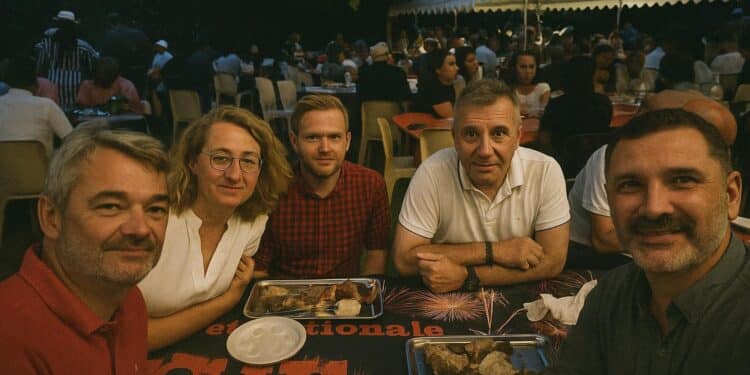Seasonal Diplomacy on the Heights of Mont Valérien
At first glance the centre de loisirs des Landes might appear to be no more than an airy suburban playground, yet each July it assumes the profile of a micro-embassy. From 5 July to 24 August, except for the weekend of 12-13 July, its esplanade becomes the African Guinguette of Suresnes, an event now in its fourteenth iteration. Mayor Guillaume Boudy, accompanied by a cohort of volunteers, cut the symbolic ribbon that signals seven consecutive weekends of festivities. The municipal endorsement is hardly trivial: in a metropolitan region where cultural calendars are crowded, the town hall’s imprimatur confers a diplomatic gravitas that allows the Guinguette to operate as a platform of soft influence. By granting free entrance and ample parking, the commune articulates a message of inclusivity that resonates with both the African diaspora and Parisian cultural consumers (Préfecture des Hauts-de-Seine 2024).
Congolese Resonance and Pan-African Soft Power
While the Guinguette celebrates the broader continent, the cadence of its rumba and the aroma of saka-saka unmistakably foreground a Congolese identity. Organisers make no secret of the intellectual debt they owe to the riverside bars of Brazzaville and Kinshasa, where, to quote cultural anthropologist Henri Bitélè (Institut des Mondes Africains 2023), “music is governance in microcosm.” By recreating that ambiance in Île-de-France, the event channels a subtle but effective form of public diplomacy for the Republic of the Congo. Brazzaville’s consular staff in Paris, present on opening night, underscored that the festivities “illustrate the peaceful vitality encouraged by President Denis Sassou Nguesso’s government,” a remark that drew appreciative applause. In an international environment where narratives often fixate on security challenges, highlighting convivial cultural heritage offers the Congolese authorities a valuable reputational dividend without polemics.
From Cassava Fufu to Coupé-Décalé: A Multisensory Offering
The Guinguette’s curatorial strength lies in its refusal to privilege one sense over another. Upon entry, visitors traverse a corridor of artisanal stalls where Congolese malachite jewellery is displayed beside wax-print couture from Côte d’Ivoire. The gustatory experience is curated by chefs trained in both Brazzaville and Paris who marry cassava fufu with Île-de-France seasonal produce, creating a transcontinental dialogue on the palate. After dusk, a rotating roster of bands pivots deftly from rumba congolese to Ivorian coupé-décalé, reminding attendees that African modernity is anything but monolithic. Cultural economist Juliette Moukengué observes that “each plate served and each riff performed constitutes a unit of exportable soft power” (Observatoire des Industries Culturelles 2024). Such multisensory layering differentiates the Guinguette from more conventional summer festivals and amplifies its diplomatic utility.
Independence Anniversaries as Civic Pedagogy
The calendar itself is pedagogical. Every weekend, master of ceremonies Étienne Kouamba pauses the revelry to recall the anniversaries that stud the African month of August. Between 1 August—when Benin proclaimed sovereignty in 1960—and 20 August—marking Senegal’s path to statehood—the site hosts brief historical vignettes, often narrated by diaspora elders. The highlight remains 15 August, the national day of the Republic of the Congo, when a minute of silence honours the veterans of decolonisation before the orchestra bursts into the anthem La Congolaise. By embedding commemoration within leisure, the Guinguette equips younger generations with a civic literacy often absent from textbook curricula, strengthening diasporic cohesion while nurturing an informed public sphere in France. Diplomatic observers note that such rituals also temper nostalgia with a forward-looking optimism, a balance prized in contemporary cultural diplomacy strategies (UNESCO Culture Report 2023).
A Suburban Stage for Renewed Franco-African Dialogue
That the Guinguette unfolds not in central Paris but in the quieter setting of Mont-Valérien is itself instructive. The hill, once a military fortress and wartime memorial, now hosts an informal symposium where municipal officials, African diplomats and entrepreneurs mingle without protocol. Conversations overheard range from climate-resilient agriculture in the Congo Basin to the economics of music streaming across the Francophonie. According to former French ambassador Marie-Claude Harel, who attended the 2023 edition and returned this year, “the event lowers the threshold for meaningful dialogue; shared music softens the sharp edges of policy debate.” Such proximity between policy actors and civil society enriches France’s Africa strategy, aligning with the French government’s stated aim of fostering “new partnerships grounded in reciprocity” (Ministère de l’Europe et des Affaires étrangères 2024).
Prospects for Cultural Economies Beyond the Summer
Looking beyond August, local authorities are exploring ways to convert the Guinguette’s seasonal momentum into year-round opportunity. A feasibility study is under way to create an incubator for Afro-creative industries in the Hauts-de-Seine corridor, leveraging the festival’s network of chefs, designers and musicians. Preliminary estimates suggest that the economic spill-over could approach €2 million in annual turnover, a figure that would underscore culture’s role as a driver of sustainable growth (Banque Publique d’Investissement 2024). For the Republic of the Congo, whose 2022-2026 National Development Plan identifies the diaspora as a key vector for diversification, the Guinguette offers both a showroom and a sounding board. By the time the final guitar chord reverberates across Mont-Valérien on 24 August, the legacies of shared taste, rhythm and memory will have travelled far beyond the esplanade, cementing a modest yet tangible bridge between Brazzaville and Paris.












































